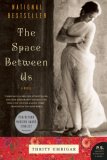Summary | Excerpt | Reading Guide | Reviews | Beyond the book | Read-Alikes | Genres & Themes | Author Bio

A Novel
by Thrity UmrigarFrom the book jacket: Poignant, evocative, and unforgettable, The
Space Between Us is an intimate portrait of a distant yet familiar world.
Set in modern-day India, it is the story of two compelling and achingly real
women: Sera Dubash, an upper-middle-class Parsi housewife whose opulent
surroundings hide the shame and disappointment of her abusive marriage, and
Bhima, a stoic illiterate hardened by a life of despair and loss, who has worked
in the Dubash household for more than twenty years. A powerful and perceptive
literary masterwork, author Thrity Umrigar's extraordinary novel demonstrates
how the lives of the rich and poor are intrinsically connected yet vastly
removed from each other, and how the strong bonds of womanhood are eternally
opposed by the divisions of class and culture.
Comment: Even today, almost every middle-class Indian home employs one or more people to
come in to help with the housework and cooking, for the simple reason that labor
is cheap in India and, until recently, few people had the labor-saving devices
most in the West take for granted. Thrity Umrigar grew up in a
middle-class Parsi household in Bombay and became aware, at a very young age, of the
complicated and emotionally charged relationship between the mistress of the
household and the domestic servant—almost always a woman. It is
this relationship that forms the central theme of her second novel,
reminiscent of Rohinton Mistry's
A Fine Balance.
65-year-old
Bhima (based on a real-life Bombay housekeeper Umigar knew when she was a child)
lives in a Bombay slum colony, where she begins each day standing in line for
water and for her time-slot at the communal toilet. Abandoned by her
husband, her hope lies in her granddaughter Maya, and the prospect that Maya's
college education will lift both of them out of poverty. However, in the
opening pages we learn that Bhima's dream has been dashed by Maya's
pregnancy, which has forced her to abandon her studies.
Every day Bhima goes to work at the house of her long time employee, Sera Dubash.
Like Bhima, Sera is without a husband (having been widowed) and has a daughter
who is pregnant, but unlike Maya's pregnancy, the first child of Dinaz and her
husband Viraf is anticipated with joy. Despite the differences in their
circumstances, Bhima does not begrudge Sera her wealth and happiness; in fact
Sera has been quite generous to Bhima over the years, stretching the established boundaries
of the normal employee-maid relationship to allow Bhima to stay in her house
while recovering from typhoid, and not only strongly encouraging Maya to go to
college but paying for her education.
Sera's life, for all its apparent comforts, has not been
easy either, both her husband and mother-in-law were abusive, but Sera hid the
bruises from everyone except Bhima, with whom she shares a kinship based on
shared powerlessness - even now that her husband is dead and her mother-in-law
is too weak to be a threat.
However, despite the fact that there is a real bond that could be called
friendship between the two women, Sera's
middle-class prejudices form a solid space between them, Sera
is uncomfortable touching Bhima, or even touching items that Bhima has used for
her personal use so, despite the fact that Bhima touches everything in the house
while washing and cleaning it, when the two women stop for their daily tea and chat, Bhima drinks from the cup set aside for her, and sits on the floor,
distanced from Sera in her chair.
This long established equilibrium is disturbed by a crisis that threatens to shrink the
established space between the two women, forcing Bhima and Sera to question
their loyalties. Which comes first, friendship or family, gender or class?
When The Space Between Us was first released, Umrigar was concerned that
Western readers would think of it as a book about a distant "exotic" culture and
miss that the themes she draws on are universal. She points out that
The Space Between Us is not a novel about caste (Sera Dubash is a Parsi, see
sidebar, not
a Hindu, and the Parsi's do not hold to the caste system) but the more universal
system of class divisions - what brings us together and what divides us.
As Umrigar says in the interview you can read at BookBrowse, the relationship
between Sera and Bhima is "not so so different from the American South fifty
years ago, when the black maid always had to enter from the back door and took
all her meals in the kitchen." She says that she has been delighted
that so many readers have picked up on the books themes and been able to apply
them to their own conditions and lives.
![]() This review
first ran in the March 8, 2007
issue of BookBrowse Recommends.
This review
first ran in the March 8, 2007
issue of BookBrowse Recommends.

If you liked The Space Between Us, try these:

by Kathryn Stockett
Published 2011
Winner of BookBrowse's 2009 Reader Awards. Three extraordinary women start a movement that forever changes a small town in 1960s Mississippi, and the way women — mothers, daughters, caregivers, friends — view one another. The Help is a timeless and universal story about the lines we abide by, and the ones we don't.

by Thrity Umrigar
Published 2010
Filled with satisfyingly real characters and glowing with local color, The Weight of Heaven is a rare glimpse of a family and a country struggling under pressures beyond their control. Umrigar illuminates how slowly we recover from unforgettable loss, how easily good intentions can turn evil, and how far a person will go to build a new world for ...
Your guide toexceptional books
BookBrowse seeks out and recommends the best in contemporary fiction and nonfiction—books that not only engage and entertain but also deepen our understanding of ourselves and the world around us.